In the ever-evolving digital landscape, creating a captivating and functional website is paramount for individuals and businesses alike. As you embark on the journey of building your online presence, the platform you choose can significantly impact the success and effectiveness of your website.
While Wix offers a remarkable canvas for website creation, it’s important to recognize that no single platform fits all molds. Just as every business, individual, or creative endeavor is unique, so are the requirements of their digital presence. As you venture beyond Wix, you’ll discover a range of alternatives that cater to specific niches, expertise levels, and objectives. Whether you’re an entrepreneur setting up an e-commerce store, a blogger seeking to share your voice, or a creative professional aiming to showcase your portfolio, the world of website builders has a tailored solution waiting for you.
Remember that your website is more than just a digital space; it’s an extension of your brand, your voice, and your aspirations. By the time you finish reading this guide, you’ll have the knowledge and insight needed to select a website building platform that aligns perfectly with your goals. So, let’s dive into the world of Wix alternatives and uncover the one that will empower you to create a website that leaves a lasting impression on your visitors.
Why Look for Wix ALternatives?
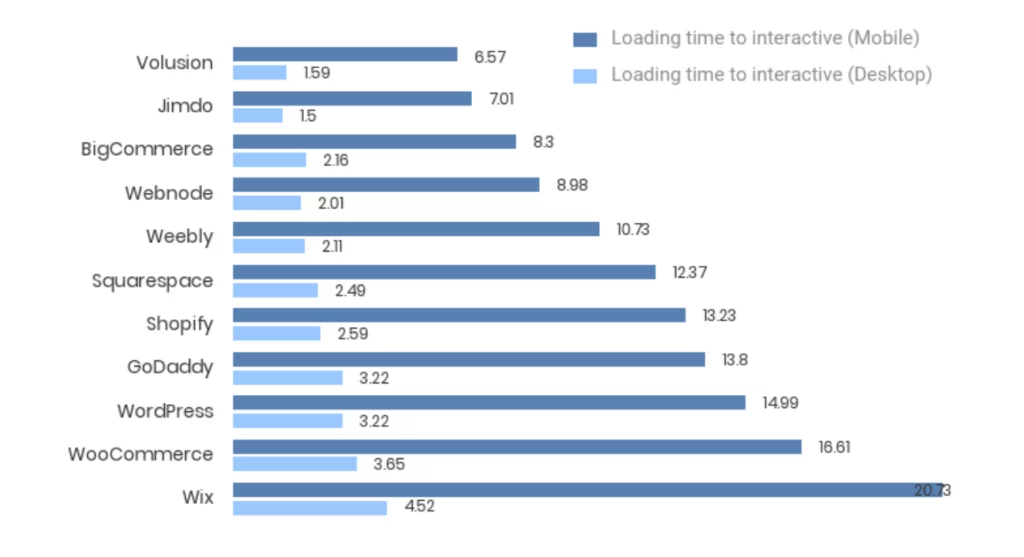
- Customization Limitations: While Wix offers a variety of templates, the level of customization can be limited. If you seek a more unique and personalized website design, other alternatives might provide more flexibility.
- Cost: Wix offers different pricing plans, but some users may find the costs of premium plans and add-ons to be higher than other website builders with similar features.
- Ownership and Portability: With Wix, you build your website on their platform, which means your site’s data is hosted by them. This can make it challenging to switch to another platform in the future if needed.
- SEO and Performance: Some users find that Wix websites may not perform as well in search engine rankings compared to websites built on other platforms. Additionally, the loading speed and overall performance of Wix sites might not be as optimized as other alternatives.
- E-commerce Capabilities: If you plan to run an online store, you might find that other website builders offer more advanced and comprehensive e-commerce features than Wix.
- Integration and Compatibility: While Wix does provide integrations with various apps and services, other alternatives may offer a wider range of third-party integrations to enhance your website’s functionality.
- Support and Community: While Wix offers customer support, some users might prefer a platform with a more active and engaged community, which can be valuable for getting help, sharing knowledge, and finding inspiration.
Top 9 Wix Alternatives of 2023:
1. CMS Hub
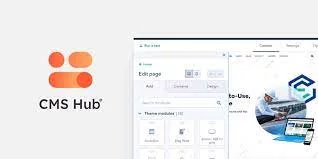
Best Suited for: Teams
Why Choose CMS Hub over Wix: In contrast to Wix, which functions as a hosted website builder, CMS Hub emerges as a fully integrated proprietary content management system. It boasts specialized features catering to the collaborative needs of marketers, developers, and IT professionals, enabling them to collaboratively construct intricate and secure websites surpassing the capabilities of Wix.
For marketers, a user-friendly drag-and-drop editor, integrated SEO tools, and contact attribution reporting ensure the creation and optimization of content tailored to each visitor. Developers revel in serverless functions, adaptable theme choices, and command line tools that facilitate rapid modifications and personalized web assets. IT professionals enjoy the protective embrace of a Web Application Firewall, SSL, and a dedicated security team that ensures their site’s safety.
CMS Hub extends its prowess through an inbuilt content delivery network (CDN), enhancing not only site speed but also its security. This CDN ensures rapid, secure, and low-latency content distribution globally. Moreover, you gain the ability to monitor potential attack volumes and probes exploring site vulnerabilities, fortifying the defense of your CMS-hosted website, blogs, and landing pages.
Drawbacks of CMS Hub: Given the elevated functionality and security standards of CMS Hub, the investment required exceeds that of a Wix site. This might be prohibitive for individuals and businesses constrained by tighter budgets. Nevertheless, the availability of the cost-effective CMS-Free option offers a workaround, albeit with certain limitations to weigh.
Exemplifying CMS Hub: For instance, consider the case of Coke Northeast, a brand seeking to revamp its online presence to intensify community engagement and awareness. Leveraging HubSpot’s CMS Hub, they engineered a website that effectively recruits new employees, engages vendors and distributors, and reiterates their dedication to their community.

CMS Hub presents two distinct pricing tiers. CMS Hub Professional commands a monthly fee of $300, while CMS Hub Enterprise demands $900 per month.
2. Squarespace
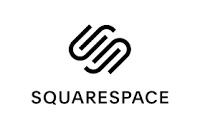
Best Suited for: Creative individual
Why Opt for Squarespace over Wix: If your goal involves crafting an online portfolio, Squarespace is your go-to choice. While it presents a narrower array of templates compared to Wix, the ones it offers have garnered accolades and are exceptionally adaptable. The incorporation of Squarespace’s LayoutEngine and Content Block system empowers you to devise bespoke content types and intricate multi-column layouts. The platform even facilitates the installation of multiple templates on your site, enabling the simultaneous exploration of diverse designs. Moreover, thanks to the integrated CSS editor, you can inject custom CSS into any template.
Despite the caution against excessive custom code to avoid sluggishness, Squarespace boasts a relatively lightweight codebase. Techniques to enhance your site’s speed include the distribution of content across pages to maintain sizes under 5MB, compression of image files, employment of excerpts on the blog homepage, and streamlining redirects.
Drawbacks of Squarespace: While Squarespace affords you a more tailored and speedier site experience, some trade-offs are inevitable. Unlike Wix’s abundant selection of third-party apps available in its marketplace, Squarespace’s flexibility is limited. With the exception of a few extensions primarily catering to ecommerce sites, you’re confined to the features that Squarespace offers.
Squarespace Showcase: Take the instance of acclaimed actress Winona Ryder who sought to exhibit images from a photo essay she creatively directed. Additionally, she aimed to vend copies of the book based on the aforementioned essay.

Squarespace extends a variety of premium plans priced at $12, $18, $26, and $40 per month, respectively. It’s important to note that there is no free plan available with Squarespace.
3. WordPress
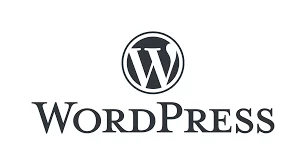
Best Suited for: Blogging Enthusiasts
While Wix offers a plethora of over 50 blogging templates along with basic features such as an integrated commenting system and taxonomies, it comes with several limitations. Notably, its post editor lacks the convenience of drag-and-drop functionality, and it lacks the provision to incorporate a featured image for blog posts.
On the contrary, WordPress boasts a collection of 3,000+ free blogging themes, a user-friendly drag-and-drop block editor, and advanced attributes like content visibility control and user roles and permissions. Furthermore, WordPress allows for the installation of plugins or direct source code manipulation to craft a blog that aligns precisely with your preferences. This includes optimizing content, enhancing site speed, and integrating CRM functionalities using WordPress plugins such as Yoast SEO, WPRocket, and the HubSpot WordPress plugin.
Limitations of WordPress: Due to the extensive array of features and extensions, and the requirement to seek out and establish your own hosting and domain, the process of creating and personalizing a WordPress site is considerably more time-consuming compared to a Wix site.
WordPress Showcase: An illustrative instance is that of Jennifer Lawson, a renowned American journalist, author, and blogger, who established her platform “The Bloggess” using WordPress.

While the WordPress platform itself is available for free, you need to bear the costs of a domain name, hosting services, and any premium plugins or themes you wish to incorporate. Consequently, the annual expense of maintaining a WordPress site varies, ranging from $30 to $3000.
4. Shopify Plus

Perfect for: Enterprises Engaged in Ecommerce
Why Opt for Shopify Plus over Wix: Though Wix does offer ecommerce plans, its capabilities are confined. On the flip side, Shopify Plus is a specialized ecommerce solution, equipped with features and extensions tailored to empower your ecommerce enterprise’s growth beyond the typical attributes. These encompass customizable templates, inventory management tools, and secure payment alternatives.
Let’s delve into some of the key offerings of Shopify Plus. There’s Shopify Payments, a facilitator for processing credit card payments on your website, eliminating transaction fees. Multi-Currency functionality permits customers to transact in their local currency, and Shopify Pay streamlines the checkout experience by allowing customers to save their payment details for swifter transactions. Moreover, Shopify Channels enables the expansion of your product reach across platforms like Amazon and Instagram, all while maintaining unified inventory and order management.
With Shopify Plus, concerns regarding site performance are also laid to rest. Its cloud-based infrastructure ensures an impressive 99.99% overall uptime, with storefronts loading four times faster compared to its competitor, BigCommerce. For those contemplating a switch from Wix to Shopify, migration tools like LitExtension can be employed to facilitate the transition.
Shortcomings of Shopify Plus: The extensive capabilities of Shopify Plus might entail a learning curve and adaptation challenges. Certain businesses might underutilize the platform, inadvertently paying for features they don’t fully employ, while others could end up complicating store management by utilizing an excessive number of features. This contrasts with Wix’s straightforwardness and user-friendly interface.
A Glimpse of Shopify Plus in Action: Bombas, having encountered website crashes on another platform, transitioned to Shopify Plus, a decision aimed at bolstering its long-term growth objectives.
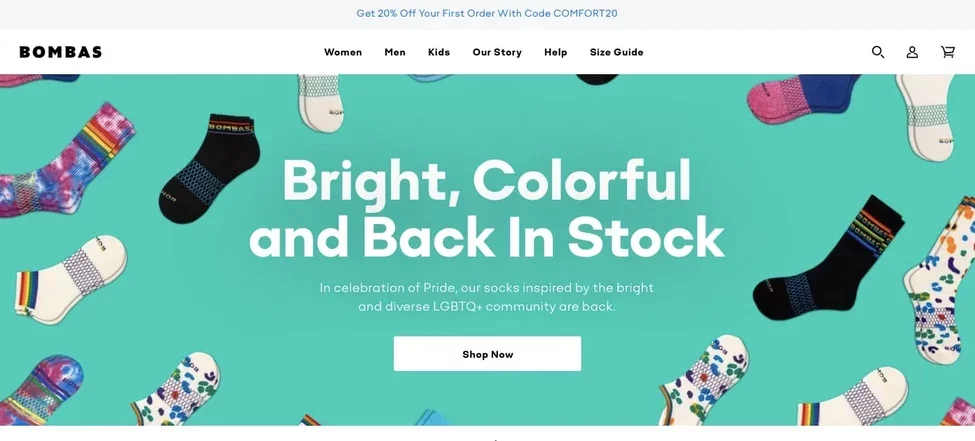
Shopify Plus commences at a monthly fee of $2,000. Businesses with higher transaction volumes might incur additional charges.
5. Weebly
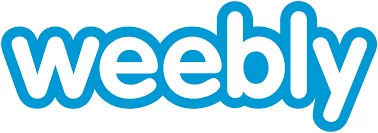
Ideal for: Novice Shop Owners
Why Opt for Weebly instead of Wix: Weebly proves to be an excellent alternative to Wix, especially for budget-conscious shop owners. Similar to Wix, it presents a free plan alongside an array of premium alternatives. What distinguishes its free plan is the inclusion of fundamental ecommerce functionalities, encompassing a shopping cart, inventory management, coupon integration, and an automatic tax calculator. This renders Weebly a more cost-effective solution for shop owners compared to Wix.
Nonetheless, akin to Wix’s model, Weebly’s free plan bears ads and necessitates the use of a Weebly subdomain. This allows you to commence without cost and subsequently upgrade to a premium plan to secure a personalized domain name, provide an ad-free browsing experience to your customers, and unveil an array of advanced ecommerce capabilities.
Drawbacks of Weebly: Although Weebly outshines Wix in terms of ecommerce features, it has its limitations elsewhere. Its template library is more limited, and it lacks crucial features like an undo button. Users aspiring to establish websites rather than online stores might find Weebly’s constraints frustrating.
A Glimpse of Weebly in Action: The Whiskey Ball, a renowned retailer of the “original” ice ball mold for cocktails, operates a splendid website powered by Weebly.

Weebly provides a confined free plan in addition to premium plans available at $6, $12, and $26 per month, respectively.
6. Contentful

Suited for: Omnichannel Marketers
Why Choose Contentful over Wix: For those seeking a platform equipped with the capabilities to generate, modify, and manage content while effectively distributing it across all digital channels, Contentful stands as a compelling alternative to Wix. This empowers businesses to streamline the creation and management of their digital content within a unified environment.
Limitations of Contentful: Given its advanced functionalities and relatively higher pricing tiers, Contentful might prove to be excessively intricate and costly for certain businesses and individuals. Those primarily focused on crafting web pages could find themselves grappling with features tailored for crafting comprehensive omnichannel digital experiences, potentially leading to an unnecessary financial burden.
Illustration of Contentful’s Effectiveness: A pertinent example is Trunk Club, which transitioned to Contentful to concentrate on producing content optimized for varying screen dimensions, rather than wrestling with diverse technologies. This shift not only facilitated changes made by marketers and stakeholders, reducing reliance on the Engineering team for content updates. The enhancement in their mobile experience post-migration is evident below.
Comparison of Trunk Club‘s Mobile Site Before and After Transition to Contentful

Contentful offers three pricing tiers: one catering to free users, another tailored for teams with a starting cost of $489 per month, and a third designed for enterprise-level companies. For precise details on enterprise pricing, direct communication with the vendor is recommended.
7. Drupal
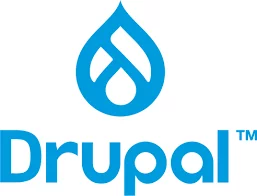
Suited for: Developers
Why Opt for Drupal instead of Wix: Developers seeking a robust open-source CMS, with proficiency in PHP, HTML, and CSS rather than Markdown syntax, will find Drupal to be a compelling alternative. This remarkably versatile CMS is tailored for constructing intricate websites dealing with substantial data volumes and high traffic. It boasts an extensive collection of more than 44,000 modules accessible in its directory, accompanied by a multitude of free themes within its theme repository. These components are impressively adaptable, enabling developers to exercise precise control over the visual and functional aspects of their websites.
Moreover, Drupal’s flexibility empowers users to decouple the front end from the back end of their sites, one of the various methods available to achieve rapid-loading websites.
Drawbacks of Drupal: Developed by and for developers, Drupal requires a foundational grasp of PHP, HTML, and CSS to fully harness its capabilities. Furthermore, the setup and configuration of your site on Drupal demand more time compared to the streamlined process offered by Wix.
Illustration of Drupal’s Effectiveness: An illustrative instance is Estee Lauder, which integrated Drupal as the backend of their learning management system. The choice was driven by Drupal’s ability to seamlessly store and organize diverse content types—ranging from text and videos to quizzes, PDFs, and audio—in various languages. The utilization of APIs facilitated content delivery across frontend devices, spanning desktops, mobile apps, and chatbots.

Drupal can be downloaded for free, but costs arise from domain name registration, hosting, and the acquisition of premium extensions or themes you may wish to implement. Non-developers might also need to enlist the services of a developer or agency for website construction and design. Consequently, Zesty.io estimates that the expense of a Drupal site can range from $15,000 to $100,000.
8. GoDaddy Website Builder
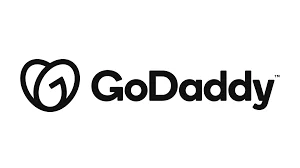
Suited for: Entrepreneurs
Why Opt for GoDaddy Website Builder instead of Wix: GoDaddy Website Builder caters to entrepreneurs aiming to swiftly initiate their online presence and gradually expand their website or online store.
This tool expedites the development process by offering an array of pre-designed templates, which you can customize using content blocks. With the Over app, generating a logo and other branded content for your website, social media platforms, and various channels becomes a swift and straightforward task. As your requirements evolve, you can incorporate more advanced features, including email and social media marketing, appointment scheduling, and PayPal payments.
Drawbacks of GoDaddy Website Builder: While GoDaddy’s editor is user-friendly, its simplicity partially arises from fewer customization and SEO options compared to Wix. In fact, some of its features can negatively impact SEO. For instance, adjusting page titles can trigger the auto-generation of new URLs. Additionally, the lack of an app store prevents you from extending your site’s functionality.
Illustration of GoDaddy Website Builder’s Effectiveness: An illustrative instance is Sweet Sisters Baking Co., a family-owned enterprise that harnessed GoDaddy to establish a premium ecommerce site. This exemplary site now features call-to-action buttons, contact forms, photo galleries, testimonials, and more, exemplifying GoDaddy’s capabilities.

Beyond the free plan, GoDaddy provides four premium plans at $9.99, $14.99, $19.99, and $24.99 per month, respectively.
9. Google Sites

Suited for: Small businesses
Why Opt for Google Sites instead of Wix: Google Sites emerges as a viable choice for budget-conscious small businesses, especially those already utilizing Google apps such as Gmail, Google Drive, Docs, and Forms. This dual advantage stems from the resemblance of Google Sites to these apps in terms of functionality, simplifying the learning curve. Additionally, seamless integration of content from other Google apps onto your Google site enhances convenience.
The initiation of building on Google Sites involves selecting a free template, personalizing its color, typography, and layout, and incorporating text, images, and videos through its streamlined editor.
Drawbacks of Google Sites: Compared to conventional website builders like Wix, Google Sites offers notably limited functionality, encompassing scarce templates and an absence of ecommerce features. Integration possibilities are restricted to other Google apps, and the platform lacks third-party extensions or add-ons akin to those available in Wix.
Why Not Opt for Google Sites instead of Wix: Google Sites’ template variety pales in comparison to Wix, and its inherent capabilities are more constrained. The absence of add-ons or third-party extensions hampers its adaptability. While small businesses aiming for a rudimentary, cost-free website may find Google Sites appealing for its simplicity, those seeking enhanced power and flexibility might encounter limitations.
Illustration of Google Sites’ Usage: Flipping Retail, a retail brand consulting firm with a staff of two, employs Google Sites to showcase a succinct overview of their team, services, and consultation options to potential clients.
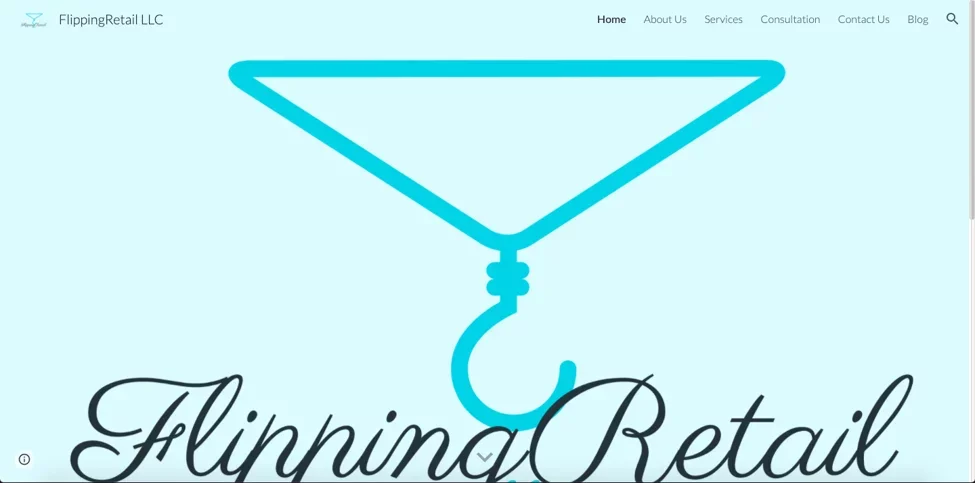
Google Sites is available for free, requiring only a Google Account for access.
Factors to Consider Before Choosing a Website Builder:
1. Define Your Goals and Needs: Begin by clarifying the purpose of your website. Are you aiming to create a dynamic blog, an engaging portfolio, a fully functional e-commerce store, or an informative site? By identifying the primary objective, you can tailor your platform choice accordingly. Additionally, pinpoint the specific features you require, whether it’s seamless online store functionality, comprehensive blogging capabilities, or the integration of multimedia elements.
2. Assess Your Technical Skills: Gauge your level of technical expertise. Are you comfortable navigating the intricacies of coding and customization, or do you prefer a more user-friendly interface that eliminates the need for coding knowledge? This assessment will help you align your platform choice with your comfort zone and skill set.
3. Budget Constraints: Establish a clear budget for your website project. Different platforms offer a range of pricing plans, including free options with limited features and premium plans that come with advanced tools. Take into account additional expenses such as domain registration, hosting fees, and the costs associated with premium features.
4. Scalability: Consider the future growth of your website. Will your site expand in terms of content volume, visitor traffic, or functionality? Opt for a platform that can accommodate your site’s anticipated growth without causing major disruptions or requiring a complete overhaul.
5. Design and Templates: Delve into the available design options and templates offered by the platform. Look for platforms that present a diverse array of templates that resonate with your website’s intended style and industry. Furthermore, examine the extent to which customization options allow you to personalize and tailor the design to your specific preferences.
6. Ease of Use: Evaluate the platform’s ease of use and user-friendliness. Seek out platforms that provide intuitive drag-and-drop editors, user-friendly interfaces, and straightforward navigation, ensuring that the website creation process is smooth and efficient.
7. Mobile Responsiveness: Ensure that the platform’s templates are optimized for mobile responsiveness. Given the significant volume of web traffic originating from mobile devices, having a mobile-friendly website is paramount to provide a seamless browsing experience for visitors on various devices.
8. SEO and Marketing: Scrutinize the platform’s provision of SEO tools, including customizable meta tags, clean URLs, and sitemap generation. Additionally, assess the platform’s compatibility with marketing tools such as Google Analytics and email marketing services, which can contribute to enhancing your website’s visibility and reach.
9. E-commerce Capabilities: If your website intends to facilitate online sales, closely examine the platform’s e-commerce capabilities. Look for features such as efficient product management, multiple payment gateways, flexible shipping options, and reliable inventory tracking.
10. Customer Support: Investigate the quality and accessibility of customer support offered by the platform. Responsive and knowledgeable customer support becomes invaluable, especially when facing technical glitches or requiring assistance in maintaining and optimizing your website.
11. Data Ownership and Portability: Ensure that you maintain control over your website’s data and content. Some platforms might impose restrictions on data portability, potentially complicating matters if you choose to switch platforms in the future.
12. Third-Party Integrations: Verify whether the platform allows seamless integration with third-party tools and services that you may require, such as social media platforms, email marketing services, and analytics tools. Such integrations enhance the functionality and reach of your website.
13. Reviews: Take the time to read user reviews and testimonials from individuals with hands on experience with the platform. Their insights can provide invaluable perspectives on the platform’s strengths and potential weaknesses, helping you make a more informed decision.
14. Trial Period: Whenever feasible, take advantage of any free trials or demo versions offered by website building platforms. These opportunities provide firsthand experience with the platform’s features, allowing you to assess its suitability before making a commitment.
Conclusion:
While Wix is undoubtedly a popular website building platform, exploring alternatives opens up a world of possibilities tailored to specific needs. From the versatile WordPress to the visually appealing Squarespace, each alternative offers unique advantages that can help you achieve your online goals. Whether you prioritize creative freedom, e-commerce excellence, or budget-friendliness, there’s a platform waiting to empower your digital journey. By carefully considering your requirements and exploring the options, you can confidently choose the perfect alternative to Wix that aligns with your vision and aspirations.
FAQs on Wix Alternatives:
Are Wix alternatives user-friendly for beginners?
Yes, many Wix alternatives are designed with user-friendliness in mind. Platforms like Squarespace, Weebly, and GoDaddy Website Builder offer intuitive drag-and-drop editors, making it easy for beginners to create and customize their websites without any coding knowledge.
How do Wix alternatives compare in terms of pricing?
Wix alternatives vary in pricing, much like Wix itself. Some platforms offer free plans with limited features, while others have tiered pricing plans based on the level of functionality you need. It’s important to consider your budget and the features you require when comparing pricing.
Can I migrate my existing Wix website to a Wix alternative?
In most cases, it is possible to migrate your content from Wix to an alternative platform. However, the process can vary depending on the platforms involved. Some website builders offer migration tools or services to help you seamlessly transfer your content, while others may require manual adjustments.



